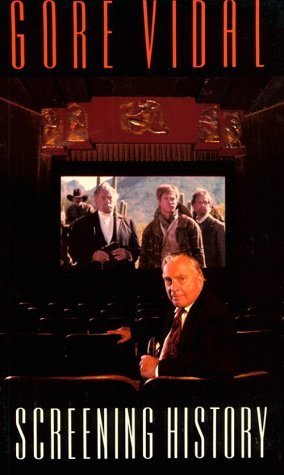I suppose that by 1992, when this was published, Gore Vidal having had a successful career as best-selling novelist, screenwriter and general bon vivant and gadfly, was at the point of life where he could toss off a lark like this with the assurance that at least some of it would be interesting. And it is. It is also something of an oddball mess.
The book is part memoir, part socio-political critique and part film survey. While individual passages in it are often insightful and elegantly rendered, the whole thing has a willy-nilly quality and often fails to hang together.
The book is broken into three lengthy sections that gravitate around three 1930s film classics that were central to Vidal's formative youth--The Prince and the Pauper, Fire Over England, and Young Mr. Lincoln. Vidal's love of movies morphed into the formation of his worldview about how events are changed, manipulated and simplified not just in movies but by governments and other institutions in order to indoctrinate and contain its citizenry.
As Vidal spins this ambitious personal narrative, we learn a lot about his young sheltered life among the eastern elites and his rather slow formation of a political consciousness. He, of course, comes off as the insufferable prig that he is, but that is not to say I don't like the guy. I do. He is, after all, one of the best political observers we have, and this book is best when Vidal waxes on issues such as the restrictions of the capitalistic national security state and the formation of our manufactured history. Vidal takes to task the "keepers of the national myths" for their maintenance of "the agreed-upon facts" and for insisting that our historical figures are either good and great or wrong and bad. It reminds me of Noam Chomsky's musings about "necessary illusions."
For all the complaints that have come about over the inaccuracy of Hollywood history, Vidal actually more or less comes to praise Tinseltown's mythmaking, concluding that is at least no worse than the kind of airbrushing that went on with the Bush administration/CNN presentation of the Gulf War, happening at the time of this book's creation. "Our genius for the metamorphosis of mere fact has achieved perfection," he wrote, not at all aware of the rise of Fox News. But more than once in this book Vidal is both consciously and unconsciously prophetic.
Some favorite passages from the book include:
"A current perjorative adjective is narcissistic. ...lately the adjective is often applied to those "liberals" who prefer to improve the lives of others rather than exploit them."
"It seemed to me as if there was a conspiracy not only to make one learn things that one did not want or need to know but, worse, to refuse to teach the things that one was eager to find out about."
"I have always found it curious that the two things a human being must cope with all his life, his body and his money, are never explained to him at school."
"From the beginning of my not-so-happy career as a dramatist, I was drawn to politics and to religion, the only two subjects that Bernard Shaw thought worth our attention and, of course, the two subjects absolutely forbidden us not only in the popular arts but in the public schools as well. Public schools do not give us our history; instead they try, nobly but futilely, to indoctrinate their charges in good citizenship. As each minority gains economic power, it is discussed in admiring terms."
There also is a marvelous anecdote Vidal tells about the making of his hard-edged political play, The Best Man into a movie in the early '60s, whereby it was almost bowdlerized by Frank Capra into a sappy populist morality play along the lines of the director's Mr. Smith Goes to Washington. Luckily for Vidal, he managed to get Capra dumped from the picture.
The book is a kind of curate's egg, not entirely of a piece but once broken and fried it makes for a temporarily satisfying sandwich.

